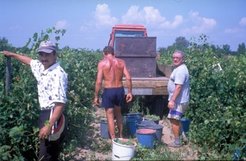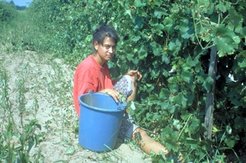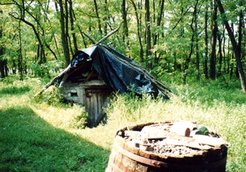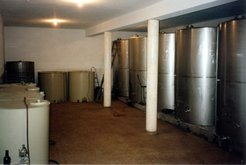The New Property System in Tázlár (2000-2005)
The New Property System in Tázlár

Picking grapes in a modern vineyard, August 2001.

This young picker is a Romanian seasonal worker from Transylvania.

The primitive cellar of Sándor Horváth (above) could collapse at any moment while that of László Szilberhorn ( below, with certificates of some of the awards he has won for his wine) is the most modern in the village.

The condition of the community's vineyards and other aspects of the wine trade proved particularly interesting, partly because the ownership of the land on which large scale vineyards were created in the last decade of socialism, in partnership with individual members, remains controversial. Many tasks in these modern vineyards can be mechanized and they now dominate production (see above). However, many farmers continue to produce on a very small scale, primarily for their own consumption; even among those with a stake in the modern vineyards, many sell their product as grapes and do not produce wine for sale at all.

Many older villagers identify emotionally with the vines which they themselves (or close relatives) have planted, or with their cellars and with old wooden barrels that often bear the engraved initials of an ancestor. They also take pride in their skills and pleasure in demonstrating the product through the tasting process. However, the new entrepreneurs store their product in vast containers made of plastic or concrete.
The village mayor comes from an established family of middle rank. He obtained a degree from an agricultural college and worked briefly as a viticulture specialist for the cooperative, before this institution withdrew from agricultural production completely. After a brief spell with the police he was elected mayor, with the support of the Independent Smallholders' Party, in 1994. He combines this post with one of the largest private vineyards in the village (11 hectares). His large prés (below, right), contrasts with the hand technology put up for sale by its owner (left).




